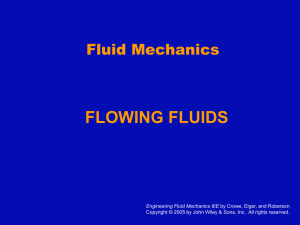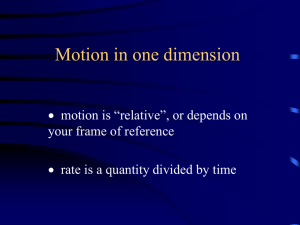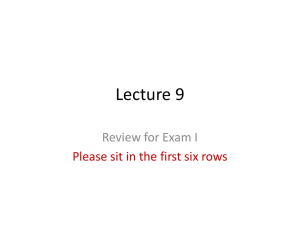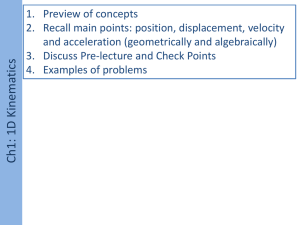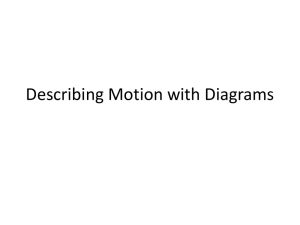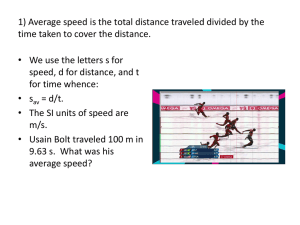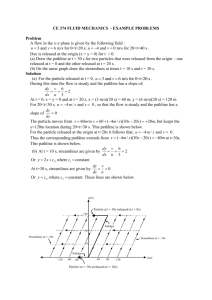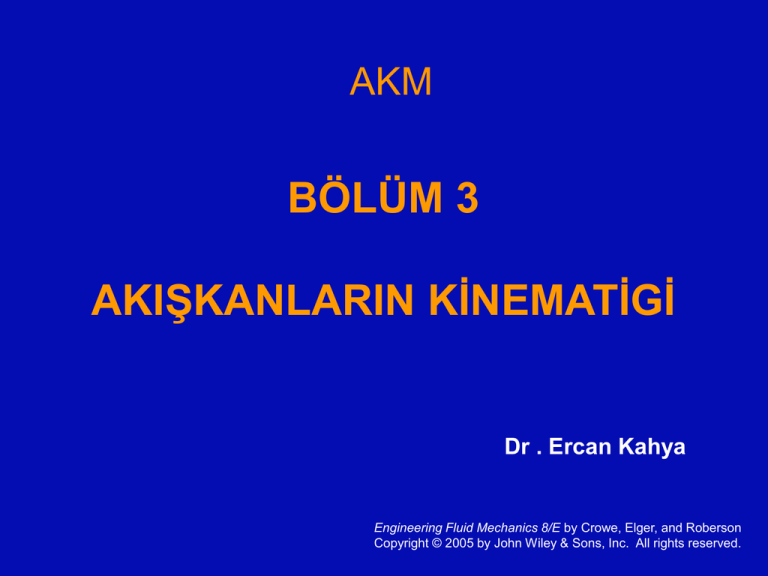
AKM
BÖLÜM 3
AKIŞKANLARIN KİNEMATİGİ
Dr . Ercan Kahya
Engineering Fluid Mechanics 8/E by Crowe, Elger, and Roberson
Copyright © 2005 by John Wiley & Sons, Inc. All rights reserved.
LAGRANGIAN & EULERIAN DESCRIPTIONS
Lagrangian Approach:
Akışkanın hareketini Lagrange bakış açısı ile belirlemek demek, her bir
akışkan parçasının yaptığı hareketi teker teker belirlemek demektir
Describe the fluid particle’s motion with time.
The path of a particle:
Velocity of a particle :
r(t) = x(t) i + y(t) j + z(t) k
i, j, k: unit vectors
V(t) = dr(t) / dt = u i + v j + w k
Eulerian Approach:
■ Akım alanının her noktasında, hareket ile ilgili büyüklüklerin (hız,
basınç, vb.) zamanla nasıl değiştiklerini belirleyelim
Imagine an array of windows in the flow field: Have information for the
fluid particles passing each window for all time.
In this case, the velocity is function of the window position (x, y, z) and time.
u = f1 (x, y, z, t)
v = f 2 (x, y, z, t)
w = f 3 (x, y, z, t)
Eulerian approach is generally favored
Streamlines & Flow Patterns
Flow Pattern: Construction of streamlines showing the flow direction
Streamlines (light blue): Local velocity vector is tangent to the streamline
at every point along the line at a single instant.
Flow through an opening in a tank &
over an airfoil section.
Streamline & Pathline
Streamline: line drawn through flow field such that local
velocity vector is tangent at every point at that instant
– Tells direction of velocity vector
– Does not directly indicate magnitude of velocity
• Pathline: shows the movement of a particle over time
► In unsteady flow, all can be distinct lines.
► The latter two tells us the history of flow as the former
indicates the current flow pattern.
3.3. AKIM ÇiZGiSi VE AKIM BORUSU
■ Hız vektörlerine teğet olarak
çizilen eğrilere akım çizgileri
denir.
Akım çizgisi ile Şekil 3.1 de tanımlanan yörünge aynı şey midir?
Akım çizgisi ve yörünge ancak, zamanla-değişmeyen akım halinde üst üste düşerler.
Zamanla-değişen akım halinde bunlar farklı farklı şeylerdir.
Examples...
Predicted streamline pattern over the
Volvo ECC prototype.
Pathlines of floating particles.
TYPES OF FLOW
Express velocity V = V(s,t)
Uniform: Velocity is constant along a streamline
(Streamlines are straight and parallel)
V
0
s
Non-uniform: Velocity changes along
a streamline (Streamlines are curved
and/or not parallel)
V
0
s
Vortex flow
TYPES OF FLOW
Steady: streamline patterns are not changing over time
zamanla-değişmeyen akım (permanan akım)
V
0
t
Unsteady: velocity at a point on a streamline changes over
time
V
0
t
Flow patterns can tell you whether flow is uniform or
non-uniform, but not steady vs. unsteady… Why?
Because streamlines are only instantaneous representation of the flow velocity.
LAMINAR & TURBULENT FLOW
(a)
(b)
(a) Experiment to illustrate the type of the flow
(b) Typical dye streaks for different cases
LAMINAR & TURBULENT FLOW
Engineering Fluid Mechanics 8/E by Crowe, Elger, and Roberson
Copyright © 2005 by John Wiley & Sons, Inc. All rights reserved.
DIMENSIONALITY OF FLOW FLIED
→ Characterized by the number of spatial dimensions needed to describe velocity field.
1-D flow:
Axisymmetric uniform flow
in a circular duct
2-D flow:
Uniform flow in a square
duct
3-D flow:
Uniform flow in an
expanding square duct
FLOW ACCELERATION (rate of change of velocity with time)
• Consider a fluid particle moving along
a pathline...
• There are two components of
acceleration:
Tangential to pathline
at : the time-dependent acceleration
related to change in speed.
Normal to pathline
an : the centripetal acceleration
related to motion along a curved
pathline.
Flow Acceleration
Local acceleration – occurs when flow is unsteady (direction
or magnitude is changing with respect to time)
Convective acceleration – occurs when flow is nonuniform
(acceleration can depend on position in a flow field)
Centripetal acceleration – occurs when the pathline is curved
(normal to the pathline & directed toward the center of rotation)
Example: Convective Acceleration
The nozzle shown below is 0.5 meters long. Find the convective
acceleration at x = 0.25 m. The equation describing velocity
variation is provided below.
Problem 4.17:
Problem 4.17: (Solution)
Example:

